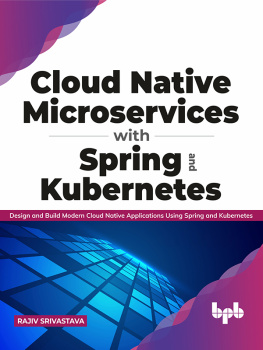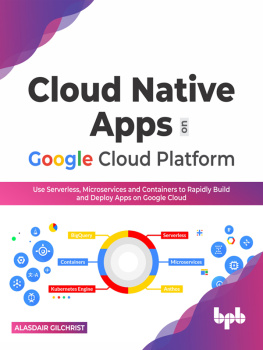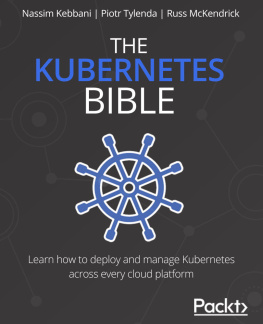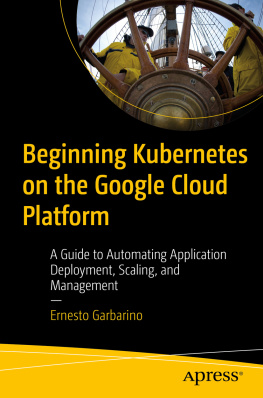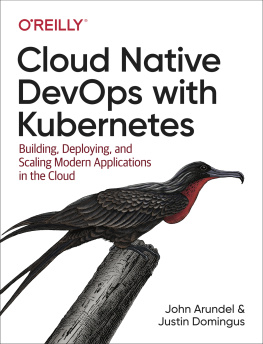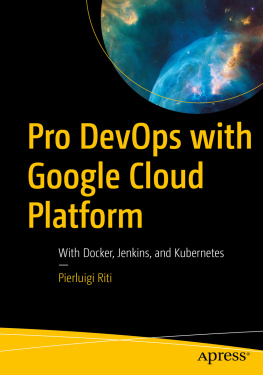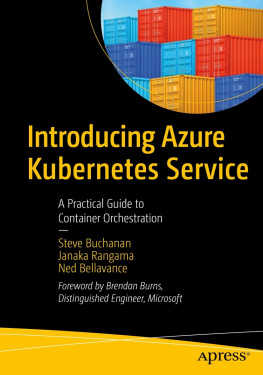Srivastava - DevOps on Google Cloud Platform: Covering Docker, Jenkins, Kubernetes
Here you can read online Srivastava - DevOps on Google Cloud Platform: Covering Docker, Jenkins, Kubernetes full text of the book (entire story) in english for free. Download pdf and epub, get meaning, cover and reviews about this ebook. year: 2021, publisher: UNKNOWN, genre: Home and family. Description of the work, (preface) as well as reviews are available. Best literature library LitArk.com created for fans of good reading and offers a wide selection of genres:
Romance novel
Science fiction
Adventure
Detective
Science
History
Home and family
Prose
Art
Politics
Computer
Non-fiction
Religion
Business
Children
Humor
Choose a favorite category and find really read worthwhile books. Enjoy immersion in the world of imagination, feel the emotions of the characters or learn something new for yourself, make an fascinating discovery.

- Book:DevOps on Google Cloud Platform: Covering Docker, Jenkins, Kubernetes
- Author:
- Publisher:UNKNOWN
- Genre:
- Year:2021
- Rating:5 / 5
- Favourites:Add to favourites
- Your mark:
- 100
- 1
- 2
- 3
- 4
- 5
DevOps on Google Cloud Platform: Covering Docker, Jenkins, Kubernetes: summary, description and annotation
We offer to read an annotation, description, summary or preface (depends on what the author of the book "DevOps on Google Cloud Platform: Covering Docker, Jenkins, Kubernetes" wrote himself). If you haven't found the necessary information about the book — write in the comments, we will try to find it.
DevOps on Google Cloud Platform: Covering Docker, Jenkins, Kubernetes — read online for free the complete book (whole text) full work
Below is the text of the book, divided by pages. System saving the place of the last page read, allows you to conveniently read the book "DevOps on Google Cloud Platform: Covering Docker, Jenkins, Kubernetes" online for free, without having to search again every time where you left off. Put a bookmark, and you can go to the page where you finished reading at any time.
Font size:
Interval:
Bookmark:
DevOps on Google Cloud Platform: Covering Docker, Jenkins, Kubernetes Copyright 2021 by Sachin Srivastava
This work is subject to copyright. All rights are reserved by the Author, whether the whole or part of the material is concerned, specifically the rights of translation, reprinting, reuse of illustrations, recitation, broadcasting, reproduction on microfilms or in any other physical way, and transmission or information storage and retrieval, electronic adaptation, computer software, or by similar or dissimilar methodology now known or hereafter developed.
Trademarked names, logos, and images may appear in this book. Rather than use a trademark symbol with every occurrence of a trademarked name, logo, or image, we use the names, logos, and images only in an editorial fashion and to the benefit of the trademark owner, with no intention of infringement of the trademark.
The use in this publication of trade names, trademarks, service marks, and similar terms, even if they are not identified as such, is not to be taken as an expression of opinion as to whether or not they are subject to proprietary rights.
While the advice and information in this book are believed to be true and accurate at the date of publication, neither the author nor the publisher can accept any legal responsibility for any errors or omissions that may be made.
Printed on acid-free paper v
v  vi
vi vii
vii  viii
viii
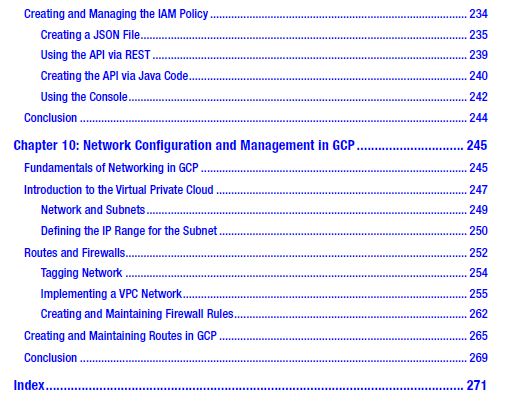 x
x Sachin Srivastava has more than 15 years of extensive experience in the design and development of different scale applications, particularly in the telecommunications and manufacturing industries. He is also a freelance consultant, with specialization in DevOps, cloud, and security..


Gerald Black is a DevOps engineer who has written three books about DevOps and micro=services. He works as a consultant, helping large companies to advance their systems development, by tweaking related software processes and tools. Gerald is also a Google Developer Expert in Kubernetes (Google Container Engine) and a member of the Node.js foundation.
xiiiMy thanks go to Gerald Black, for the amazing feedback he provided during the technical review of the text. Another big thank you to Vikas Singh, and Auchitya, for theirsupport and help in completing this book.
xvCloud technology is increasingly present in our daily lives. The intent of this book is to introduce Google Cloud Platform, of cloud computing services, with an eye to practical DevOpspractices.
DevOps is currently a hot commodity in the information technology (IT) field, and every day, a new company begins to adopt its practice. The cloud is a natural environment for DevOps, because in the cloud environment, such practices as infrastructure as code and continuous delivery can be adopted more efficiently. Thus, the cloud is the natural environment in which DevOps can grow and be increasingly effective.
In 2003, Google created Site Reliability Engineering (SRE). This represented a new approach to the continuous large-scale release of product features. SRE shares many concepts with DevOps. I use Google Cloud Platform, because it is one of the most highly recommended by Gartner, particularly its use in infrastructure development. As with the Gartner Magic Quadrant, Google offers strong network management, and with the integration of Kubernetes, it is ideal for developing container and infrastructure solutions. By adding code, Google Cloud Platform offers a complete solution for creating the deployment management for release of infrastructure. In addition, Google Cloud Platform has one of the highest levels of application programming interface (API) available in the cloud environment.
All the codes in this book can be accessed from the related GitHub site. Please feelfree to read that code and alter it for your personal use.xvii
DevOps, DevOps, DevOps, there is hardly a day in our professional lives that we dont hear that mantra. The reason is simple: by adopting DevOps practices, a company can reduce time to market, the time necessary to identify a new software or other requirement and to put it in place.
In this chapter, I introduce some of the advantages of DevOps and the changes that must be made to accommodate and promote their use most profitably by a company.The term DevOps is derived from the combination of two words: developer and operations . DevOps is used to define a movement born of the need for reducing barriers between the development and operations teams of a company. The goal of DevOps is to reduce time to market. This means adopting DevOps practices, to reduce the time needed, from the identification of a new requirement to the time it goes live for customers. The DevOps journey introduces such practices as continuous integration and continuous delivery, which help to reduce time to market and produce better quality software.
The most significant and possibly most expensive failures related to a new release occurred in 2012, when Knight Capital Group, a global financial services firm, lost $440 million, owing to a glitch in its servers during the release process, and, in 2013, when an upgrade failure at Goldman Sachs sent orders accidentally, resulting in the loss of what was thought to have been millions of dollars. DevOps allows a set of practices that can reduce potentially expensive errors.
When we think of DevOps, we must think of a movement formed to change how an entire company works together. The goal is to build a set of practices that can be used to reduce impediments to communication across different departments in the company. To be successful, DevOps should be promoted at the highest level of the company and accepted by each of its departments.
The philosophy behind DevOps was born in 2008, at the Agile conference in Toronto, Canada. During this conference, Patrick Debois presented his talk Infrastructure and Operations. In it, Debois expounded on the application of Agile methodologies for building an infrastructure. He offered three case studies and, at the end, proposed a better method of communication and other improvements allowing developers to gain more IT skills, in the sense of the system knowledge necessary to ensure a smoother release process.
Font size:
Interval:
Bookmark:
Similar books «DevOps on Google Cloud Platform: Covering Docker, Jenkins, Kubernetes»
Look at similar books to DevOps on Google Cloud Platform: Covering Docker, Jenkins, Kubernetes. We have selected literature similar in name and meaning in the hope of providing readers with more options to find new, interesting, not yet read works.
Discussion, reviews of the book DevOps on Google Cloud Platform: Covering Docker, Jenkins, Kubernetes and just readers' own opinions. Leave your comments, write what you think about the work, its meaning or the main characters. Specify what exactly you liked and what you didn't like, and why you think so.



